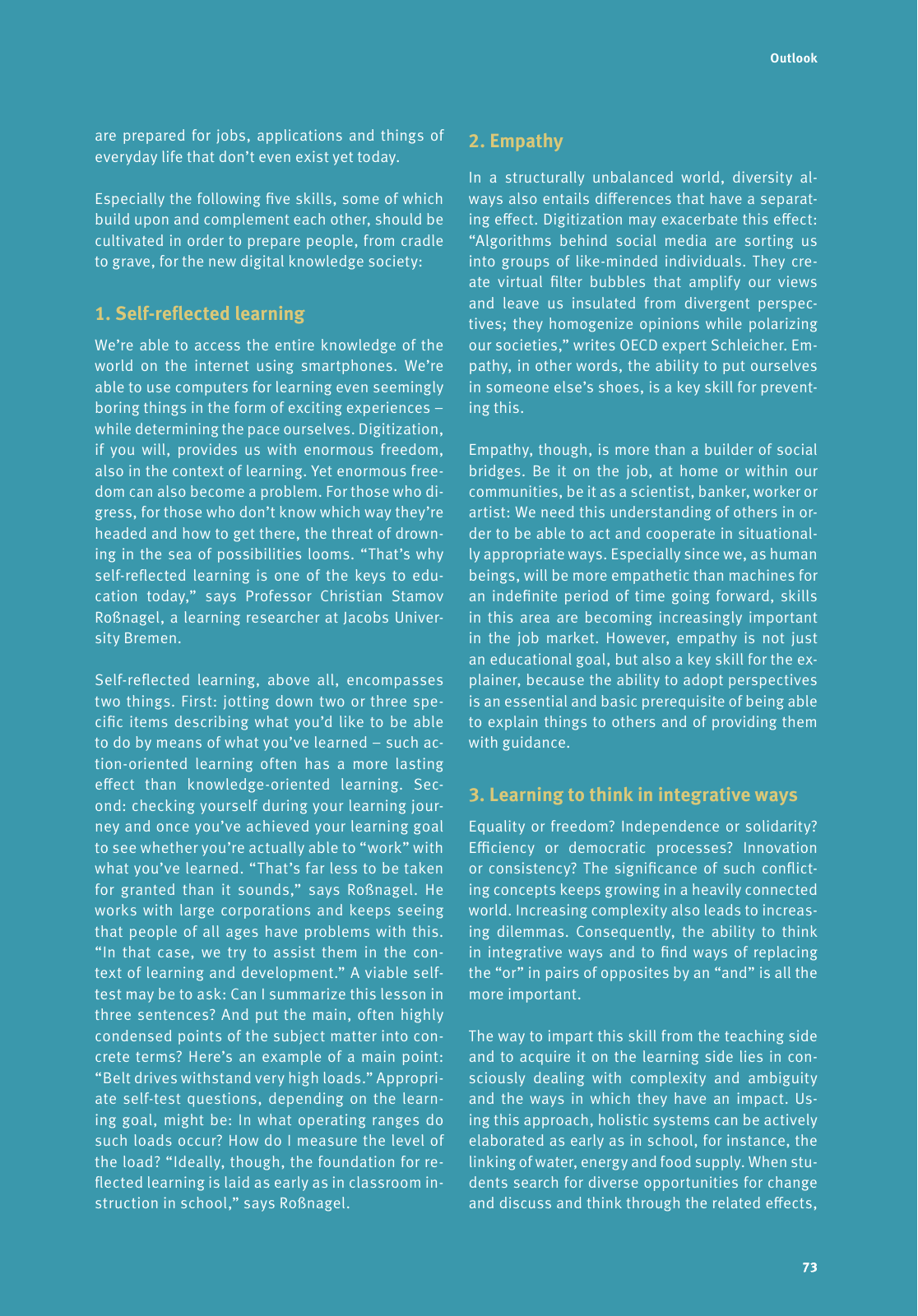2 Empathy In a structurally unbalanced world diversity al ways also entails differences that have a separat ing effect Digitization may exacerbate this effect Algorithms behind social media are sorting us into groups of like minded individuals They cre ate virtual filter bubbles that amplify our views and leave us insulated from divergent perspec tives they homogenize opinions while polarizing our societies writes OECD expert Schleicher Em pathy in other words the ability to put ourselves in someone else s shoes is a key skill for prevent ing this Empathy though is more than a builder of social bridges Be it on the job at home or within our communities be it as a scientist banker worker or artist We need this understanding of others in or der to be able to act and cooperate in situational ly appropriate ways Especially since we as human beings will be more empathetic than machines for an indefinite period of time going forward skills in this area are becoming increasingly important in the job market However empathy is not just an educational goal but also a key skill for the ex plainer because the ability to adopt perspectives is an essential and basic prerequisite of being able to explain things to others and of providing them with guidance 3 Learning to think in integrative ways Equality or freedom Independence or solidarity Efficiency or democratic processes Innovation or consistency The significance of such conflict ing concepts keeps growing in a heavily connected world Increasing complexity also leads to increas ing dilemmas Consequently the ability to think in integrative ways and to find ways of replacing the or in pairs of opposites by an and is all the more important The way to impart this skill from the teaching side and to acquire it on the learning side lies in con sciously dealing with complexity and ambiguity and the ways in which they have an impact Us ing this approach holistic systems can be actively elaborated as early as in school for instance the linking of water energy and food supply When stu dents search for diverse opportunities for change and discuss and think through the related effects are prepared for jobs applications and things of everyday life that don t even exist yet today Especially the following five skills some of which build upon and complement each other should be cultivated in order to prepare people from cradle to grave for the new digital knowledge society 1 Self reflected learning We re able to access the entire knowledge of the world on the internet using smartphones We re able to use computers for learning even seemingly boring things in the form of exciting experiences while determining the pace ourselves Digitization if you will provides us with enormous freedom also in the context of learning Yet enormous free dom can also become a problem For those who di gress for those who don t know which way they re headed and how to get there the threat of drown ing in the sea of possibilities looms That s why self reflected learning is one of the keys to edu cation today says Professor Christian Stamov Roßnagel a learning researcher at Jacobs Univer sity Bremen Self reflected learning above all encompasses two things First jotting down two or three spe cific items describing what you d like to be able to do by means of what you ve learned such ac tion oriented learning often has a more lasting effect than knowledge oriented learning Sec ond checking yourself during your learning jour ney and once you ve achieved your learning goal to see whether you re actually able to work with what you ve learned That s far less to be taken for granted than it sounds says Roßnagel He works with large corporations and keeps seeing that people of all ages have problems with this In that case we try to assist them in the con text of learning and development A viable self test may be to ask Can I summarize this lesson in three sentences And put the main often highly condensed points of the subject matter into con crete terms Here s an example of a main point Belt drives withstand very high loads Appropri ate self test questions depending on the learn ing goal might be In what operating ranges do such loads occur How do I measure the level of the load Ideally though the foundation for re flected learning is laid as early as in classroom in struction in school says Roßnagel 73 Outlook

Hinweis: Dies ist eine maschinenlesbare No-Flash Ansicht.
Klicken Sie hier um zur Online-Version zu gelangen.
Klicken Sie hier um zur Online-Version zu gelangen.